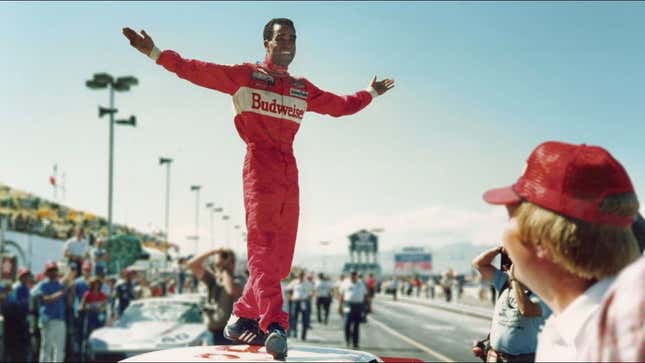
Throughout the course of history, we’ve been taught that there is a clear hierarchy in regard to a black person’s place in society. As such, the term “uppity”—which first surfaced in the 1800s as the snarky descendant of its equally demeaning predecessor “ungrateful”—has served to both dissuade and disparage those of us who’ve dared to be assertive, or whose achievements are viewed as an unwelcome infringement upon white supremacy.
Yet while most black folks find the term offensive, and rightfully so, its mere mention somehow seems to imbue racing legend Willy T. Ribbs with superhuman powers.
“They called me uppity—uppity nigger,” he reveals in the opening sequence of Uppity: The Willy T. Ribbs Story. “And I loved it.”
For those unfamiliar with Ribbs’ accolades, he’s celebrated among racing circles as the Jackie Robinson of his sport: becoming the first black driver to win a Trans-Am race in 1983, to test a Formula One car in 1986, and to qualify for the Indy 500 in 1991. Yet those feats were not without their fair share of nearly insurmountable challenges, which the documentary Uppity seeks to divulge.
“My grandfather told me, ‘You must be better. You must be—not good, not average—you must be better than the best,’” Ribbs says in the film. “He made it clear [that] it wasn’t a matter of whether you wanted to succeed or not, you’re going to.”
In watching the film, this prophecy rings true, as Ribbs, an unwelcome anomaly in his sport, is forced to endure an endless barrage of infuriating obstacles solely because of the color of his skin. From envious teammates to engine sabotage, to unjust suspensions and budgetary constraints, the 1983 Trans-Am Series Rookie of the Year prevailed year after year despite never having the luxury of an even playing field—all while maintaining his signature flair and brash demeanor.
“I wanted to show the racing world that the color of my skin doesn’t matter,” he says. “I broke down barriers that were not supposed to be broken down.”
Also of interest are the colorful allies and enemies that the now 65-year-old accrued along the way. While driver Scott Pruett—who stole a victory from Ribbs in 1987 at the Portland International Raceway and got snuffed for his trouble—is nowhere to be found in the film, luminaries like Al Unser Jr. and Bernie Ecclestone shower Ribbs with praise. Caitlyn Jenner also makes a surprise cameo to attest to the Ribbs’ tenacity, while familiar faces like promoter extraordinaire Don King, actor Paul Newman, brother in bravado Muhammad Ali and disgraced comedian Bill Cosby are revealed to have each played a key role in the wheelman’s unprecedented success.
Cosby, in particular, bankrolled what would eventually become Ribbs’ historic Indy 500 run in 1991, and while he makes it a point to note that he was completely unaware of any transgressions going on in Cosby’s personal life, he’s forever indebted to The Cosby Show creator for taking a chance on him when no one else would.
“What he did for me, nobody else did,” Ribbs told the Philadelphia Tribune in 2018. “And I’ll reiterate: If it wasn’t for Bill Cosby, I would’ve never been in IndyCar and I would’ve never been in the Indy 500. Period! When the industry I was in made death threats and called me a nigger, he was there for me. What Bill did personally was none of my business. I had no idea what he does personally because that was not our relationship.”
In all, the film does a spectacular job of capturing not only the magnitude of Ribbs’ myriad of historic feats, but the hostile climate that he dug deep to conquer as the only black man in a sea of overt racism and vitriol.
“I didn’t win the [Indy] 500, but I won against all the obstacles and the odds that were against me,” he says in the film. “I won.”
And in courageously breaking so many boundaries in a white-dominated sport, the fruits of that victory are shared throughout the entire black community—none of which would be possible had Ribbs not been reviled as “uppity.”
“What Willy did should be included in the same conservation of what Jackie Robinson, Tiger Woods, and Arthur Ashe Jr. did. Holding doors that were once closed open for us,” executive producer Nic Maye told The Root. “He is black history.”
“I think the power of the doc is that it’s a story that doesn’t need to be told, it’s a story that has to be told,” executive producer Van Lathan told The Root. “This is a black man who fought racist saboteurs, good ol’ boy systems, and economic disadvantage just to live his dreams. And he lived them. Willy Ribbs deserves his flowers. Now.”
Uppity: The Willy T. Ribbs Story is currently available on Netflix.

